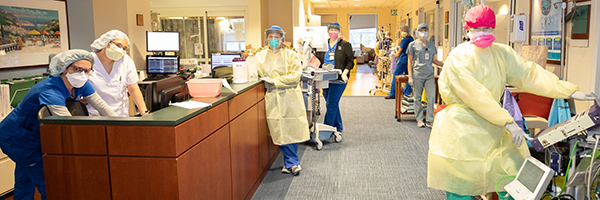EP3
Care Delivery System EP3
Nurses create partnerships with patients and families to establish goals and plans for delivery of patient-centered care.
- Provide one example, with supporting evidence, of nurses partnering with patients and families to influence change in the organization
Nurse Partnering with a Patient and Family to Improve Access to a Multiple Sclerosis Support Group
The mission of Greenwich Hospital’s Department of Nursing is to provide patients and families with safe, comprehensive and high-quality patient and family-centered care. Greenwich Hospital’s Long Ridge Medical Center, opened in 2016, is a comprehensive outpatient center (Neurology, Rheumatology, Pain Management, PT/OT, Orthopedics and North East Medical Group); provides diagnostic services (lab and radiology) and dietician and psychology services; and has an Infusion Center. The Infusion Center treats patients requiring infusions for a variety of diagnoses, including multiple sclerosis, rheumatoid arthritis and immune and hematologic disorders.
The Infusion Center nurses are committed to partnering with patients and families to meet their diverse and unique physiological and psychological needs. One way of meeting patients’ psychological needs is by providing a Multiple Sclerosis Support Group. Nursing assessments are completed during pre-treatment prior to infusion. During assessments, Helen Brugger, BSN, RN, Clinical Resource Nurse, Clinical Nurse, Charge Nurse at Long Ridge Road Infusion Center, noted that a number of patients with a diagnosis of multiple sclerosis were showing impaired coping skills. Brugger asked the patients if they were attending a multiple sclerosis support group, and most said they were not. Brugger believed that patients could improve their coping skills by attending a support group.
Nurse Partnering with Patients
Brugger decided to conduct a nursing research study to see whether patients benefited from attending a multiple sclerosis (MS) support group. Research has shown that patients who attend a support group feel a connection with others who also have a diagnosis of MS as they gain knowledge and support in health-related quality of life concerns. The literature demonstrates that good social relationships positively affect mental health and is a predictor associated with improved mental health.
Through her study, Brugger partnered with patients to discover why they were not attending the MS support group. On October 6, 2017, Brugger attended a session of the Greenwich Hospital MS Support Group to have patients participate in her survey. Patients in this study tended to carry a diagnosis for an extended duration, with a mean time from diagnosis of 19.46 years. Patients ranged from newly diagnosed to having had MS for 39 years; 65% did not belong to a support group, 30% currently attended a support group, and 5% used to belong to a support group but no longer attends.
Patients varied in when they joined a support group; while two of the patients who attended a support group joined within a week or a month, others waited more than a year. While the number of patients who reported attending a support group was small, the overwhelming majority (4 of 5) reported that attending the group improved their coping skills and that they felt the group was beneficial. In addition, everyone who attended (100%) said the group provided emotional support. Of the small number of support group participants, three said their caregiver attended with them.
The patients’ reasons for not attending the support group varied. Brugger found from patients that physical accessibility to the meeting was a barrier; while the meeting space is centrally located in Greenwich, near the hospital, the meeting room is on the third floor and there is no elevator, and parking on the street requires patients to walk 25 feet to the building’s entrance. Patients wrote on the survey that conducting the MS Support Group in a physically accessible place would improve attendance. (Evidence EP3-1, Minutes, October 6, 2017)
Brugger looked for options to relocate the Greenwich Hospital MS Support group and found a more physically accessible location, on the first floor of Long Ridge Medical Center with fully handicapped-accessible entrance. The Long Ridge Medical Center is a fully handicapped-accessible building with ample parking. As MS patients already go to Long Ridge Road for medical appointments and infusions, Brugger determined that this would be the best place for MS Support Group meetings. In December 2017, Brugger met with Kathy Carley-Spanier, MSN, RN, Director of Community Health, to request that the MS Support Group be moved to the Long Ridge Medical Center. (Evidence EP3-2, Minutes, December 6, 2017)
Carley-Spanier supported the need for an accessible meeting space, and in January 2018 she and Brugger met with Marc Kosak, SVP Operations, to explain the issue. Kosak approved moving the MS Support Group meetings to the Long Ridge Medical Center. (Evidence EP3-3, Minutes January 4, 2018)
Partnering with patients to provide patient-centered care increased attendance at the MS Support Group from four to 10-15 participants due to its physical accessibility, helping more patients improve their coping skills. The support group is announced in the Greenwich Hospital Health Extension for Community Wellness Programs and on the Greenwich Hospital programs calendar. (Evidence EP3-4, MS Support Group Flyer)

